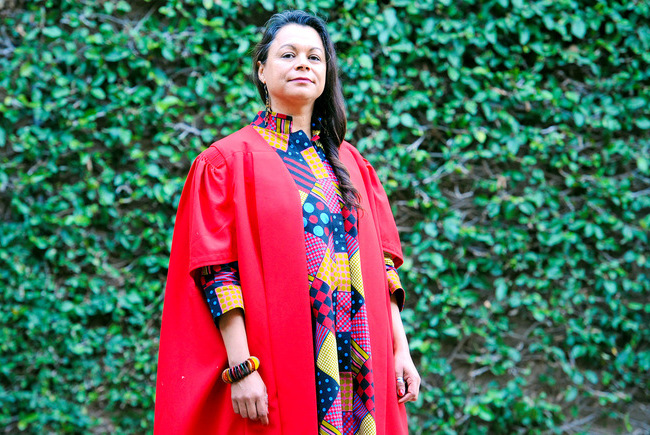Reimagining the African norm for smart cities
27 October 2023 | Story Lyndon Julius. Photos Brenton Geach. Read time 5 min.
The unique challenges inherent in African cities demand a reframing of the “norm” of smart urbanism to ensure true transformation through technology, Professor Nancy Odendaal cautioned during her inaugural lecture to mark her promotion to full professor at the University of Cape Town (UCT).
Negotiating the space between the formal and informal spheres was a central challenge to achieving authentic technological transformation on the continent, but crucial to ensure the benefits extended to disadvantaged populations, she stressed during the lecture, titled “Reframing African Smart Urbanism”, delivered on Tuesday, 24 October.
“Addressing the contradictions in African smart cities is a vital step in our journey. We must differentiate African cities from the broader smart city narrative, as the context and challenges are unique,” Professor Odendaal said.
Disrupted urbanism
Her research journey began with her PhD in 2005, culminating in the publication of her book, Disrupted Urbanism: Situated Smart Initiatives in African Cities, in January 2023. It has been hailed as a “much-needed alternative view”, leveraging examples of initiatives in a range of urban African settings to illustrate how meaningful change can be achieved.
Addressing the contradictions that encapsulate the development of African smart cities during her lecture, Odendaal argued that true transformation through technology lies in empowering individuals in their daily lives. She underscored the role of technology in everyday decision-making for disadvantaged communities, and the influence of networks that connect individuals at the margins with the more affluent.

Alignment between smart city policies and governance discourses was another crucial aspect, and she illustrated her exploration of these concepts within specific African cities, including Cape Town, Buffalo City and Ekurhuleni.
Odendaal highlighted several specific themes, including the power of disruptive platforms such as ride-hailing and food delivery apps to boost informal economies in Africa. Activism was another, specifically the value of amplifying storytelling on social media platforms to open up policy discussions, and ultimately drive change.
Building a southern perspective
She also discussed post-colonial science and technology research, emphasising the importance of building a southern perspective, including non-Western ontologies, and the interplay between technology and socio-technical practices.
“Smart African urbanism does not always lead to neat and orderly places,” she acknowledged, suggesting that future initiatives needed to take account of the historic lessons from African cities to ensure more authenticity. “Slow AI [artificial intelligence]”, she added, represented a more considered approach to AI.
“Smart African urbanism does not always lead to neat and orderly places.”
When she opened the evening’s proceedings, UCT’s Deputy Vice-Chancellor for Research and Internationalisation Professor Sue Harrison emphasised the significance of inaugural lectures in sharing academic research with broader audiences, and celebrating academic achievements.
“They also, importantly, provide an opportunity for the inaugural lecturer to share his or her insights … and to [share their work] in a way that is understandable to a broad audience,” Professor Harrison said.
 This work is licensed under a Creative Commons Attribution-NoDerivatives 4.0 International License.
This work is licensed under a Creative Commons Attribution-NoDerivatives 4.0 International License.
Please view the republishing articles page for more information.
The UCT Inaugural Lecture Series
Inaugural lectures are a central part of university academic life. These events are held to commemorate the inaugural lecturer’s appointment to full professorship. They provide a platform for the academic to present the body of research that they have been focusing on during their career, while also giving UCT the opportunity to showcase its academics and share its research with members of the wider university community and the general public in an accessible way.
In April 2023, Interim Vice-Chancellor Emeritus Professor Daya Reddy announced that the Vice-Chancellor’s Inaugural Lecture Series would be held in abeyance in the coming months, to accommodate a resumption of inaugural lectures under a reconfigured UCT Inaugural Lecture Series – where the UCT extended executive has resolved that for the foreseeable future, all inaugural lectures will be resumed at faculty level.
Recent executive communications
2025
2024

Professor Susan Cleary delivered her inaugural lecture on 14 March.
14 Mar 2024 - 5 min read2023

Prof Lydia Cairncross’s inaugural lecture provided a snapshot of the career path of a surgeon and community activist whose commitment to social justice means her work doesn’t end in the operating theatre.
02 Nov 2023 - 8 min read2022

Professor Linda Ronnie is in UCT’s Faculty of Commerce.
28 Sep 2022 - 6 min read2021
2020
2019
2018
2017
2016 and 2015
No inaugural lectures took place during 2015 and 2016.
























































.jpg)


















